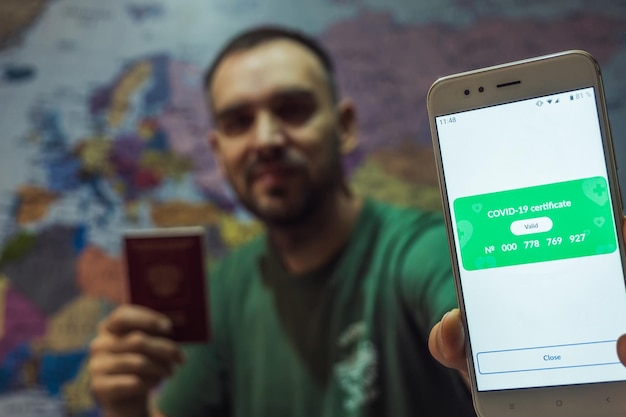Travel Scams on the Rise: Your Guide to Safe Bookings & Offers

Travel scams are increasingly common, but awareness is key to protection. Learn how to identify fraudulent bookings and offers, verify credentials, and secure your travel plans against financial loss. Stay informed to ensure worry-free travels.
Planning a trip should be exciting, not stressful. But with travel scams on the rise: How to protect yourself from fraudulent bookings and offers is crucial to guarantee a smooth and enjoyable experience. Scam artists are becoming increasingly sophisticated, making it harder to distinguish legitimate deals from traps.
This guide will equip you with the knowledge and tools to recognize and avoid these scams, ensuring your travel dreams don’t turn into nightmares. Let’s dive into the most common scams and, more importantly, how to protect your hard-earned money and peace of mind.
Understanding the Landscape of Travel Scams on the Rise: How to Protect Yourself from Fraudulent Bookings and Offers
The travel industry, while filled with opportunities for memorable experiences, has unfortunately become a fertile ground for scams. The digital age, despite its convenience, has also given rise to increasingly sophisticated methods used by fraudsters to deceive travelers. Understanding this landscape is the first step in protecting yourself from travel scams on the rise: How to protect yourself from fraudulent bookings and offers.
Common Types of Travel Scams
Here are some common types of travel scams you should be aware of:
- Fake Booking Sites: These websites mimic legitimate travel agencies or hotels, offering attractive deals that don’t exist. Unsuspecting travelers enter their payment information, only to find out later that their booking is invalid.
- Phishing Emails: Scammers send emails disguised as notifications from airlines or hotels, requesting personal or financial information under the guise of verifying a booking or claiming a special offer.
- Timeshare Resale Scams: Timeshare owners looking to sell are targeted by fraudsters promising to find a buyer, but require upfront fees that are never recovered.
- Vacation Rental Fraud: Scammers list fake vacation rentals on popular websites, collect deposits, and then disappear, leaving travelers without accommodations.
Being aware of these common scam tactics can significantly reduce your risk of falling victim to them. Always approach online travel deals with a healthy dose of skepticism.

Recognizing Red Flags: Spotting Potential Fraudulent Offers
One of the most effective ways to protect yourself from ‘travel scams on the rise: How to protect yourself from fraudulent bookings and offers’ is to recognize the red flags that indicate a potential scam. These can range from unusually low prices to questionable booking procedures.
Too-Good-to-Be-True Deals
If a travel deal seems too good to be true, it probably is. Scammers often lure victims with incredibly low prices that are far below the market average. Before booking, compare prices from multiple sources to gauge whether the offered price is realistic.
Unusual Payment Methods
Legitimate travel companies typically accept major credit cards, which offer consumer protection in case of fraud. Be wary of requests for payment via wire transfer, prepaid debit cards, or cryptocurrency, as these methods are difficult to trace and offer little to no recourse if you are scammed.
Lack of Contact Information or Physical Address
A legitimate travel agency or hotel will have readily available contact information, including a phone number, email address, and physical address. If the website or offer lacks this information, or if the contact information is suspicious (e.g., a generic email address or a disconnected phone number), proceed with caution.
High-Pressure Sales Tactics
Scammers often use high-pressure sales tactics to rush you into making a decision. They may claim that the deal is only available for a limited time or that there is limited availability. Take your time to research and verify the offer before committing.
By being vigilant and recognizing these red flags, you can significantly decrease your chances of becoming a victim of travel fraud.
Verifying Credentials: How to Ensure Authenticity Before Booking
Before making a travel booking, it’s essential to verify the credentials of the company or individual offering the service. This can help ensure that you are dealing with a legitimate business and not a scammer. Verifying credentials is an important part of Travel Scams on the Rise: How to Protect Yourself from Fraudulent Bookings and Offers.
Check Online Reviews and Ratings
Look for online reviews and ratings from previous customers. Websites like TripAdvisor, Yelp, and Google Reviews can provide valuable insights into the reputation and reliability of the company. Be wary of companies with no reviews or overwhelmingly negative reviews.
Confirm Accreditation and Memberships
Many travel agencies and tour operators are accredited by industry organizations such as the American Society of Travel Advisors (ASTA) or the Cruise Lines International Association (CLIA). Check if the company is a member of these organizations and verify their membership on the organization’s website.
Contact the Hotel or Airline Directly
If you are booking a hotel or flight through a third-party website, contact the hotel or airline directly to confirm that your reservation is valid. This can help you avoid fake booking scams.
Taking the time to verify credentials can save you from potential financial loss and travel disruptions.

Securing Your Information: Protecting Your Data and Finances
Protecting your personal and financial information is paramount when booking travel online. Scammers often target travelers’ data to commit identity theft or financial fraud. Taking steps to secure your information can help prevent travel scams on the rise: How to protect yourself from fraudulent bookings and offers.
- Use Secure Websites: When entering personal or financial information, make sure that the website is secure. Look for “https” in the URL and a padlock icon in the address bar. These indicate that the website uses encryption to protect your data.
- Use Strong Passwords: Create strong, unique passwords for your online accounts, and avoid using the same password for multiple accounts. Consider using a password manager to generate and store your passwords securely.
- Be Cautious of Public Wi-Fi: Avoid entering sensitive information when using public Wi-Fi networks, as these networks are often unsecured and vulnerable to hacking. If you must use public Wi-Fi, use a virtual private network (VPN) to encrypt your internet traffic.
- Monitor Your Accounts: Regularly monitor your bank accounts, credit cards, and travel accounts for any unauthorized activity. Report any suspicious transactions immediately to your bank or credit card company.
By prioritizing your online security, you can minimize your risk of falling victim to data breaches and financial fraud.
Staying Informed: Resources and Tools for Travelers
Staying informed about the latest travel scams and trends is essential for protecting yourself. There are many resources and tools available to help travelers stay safe and avoid fraud. Knowledge is power when it comes to travel scams on the rise: How to protect yourself from fraudulent bookings and offers.
Travel Alerts and Advisories
The U.S. Department of State and other government agencies issue travel alerts and advisories to inform travelers about potential risks and security threats in different destinations. Sign up for these alerts to stay informed about potential scams and other dangers in your travel destination.
Consumer Protection Agencies
Consumer protection agencies like the Better Business Bureau (BBB) and the Federal Trade Commission (FTC) provide resources and information on how to avoid scams and protect your consumer rights. Check these agencies’ websites for the latest news and tips.
Travel Forums and Communities
Online travel forums and communities can be valuable sources of information and advice. Travelers often share their experiences with scams and offer tips on how to avoid them. Participate in these communities to learn from others and stay informed.
Staying informed and utilizing available resources can empower you to make informed decisions and protect yourself from travel fraud.
Reporting Scams: Taking Action and Helping Others
If you fall victim to a travel scam, it’s important to take action and report the incident to the appropriate authorities. Reporting scams not only helps you potentially recover your losses but also helps protect others from falling victim to the same fraud. Reporting can help with travel scams on the rise: How to protect yourself from fraudulent bookings and offers.
File a Complaint with the FTC
The Federal Trade Commission (FTC) is the primary agency responsible for investigating and prosecuting scams and fraud. File a complaint with the FTC to report the scam and provide information about the perpetrators.
Contact Your Bank or Credit Card Company
If you paid for the travel booking with a credit card or bank account, contact your bank or credit card company immediately to report the fraud and request a chargeback or refund.
Report to Local Law Enforcement
If the scam involves identity theft or other criminal activity, report the incident to your local law enforcement agency. They may be able to investigate the scam and take action against the perpetrators.
By reporting scams, you can help prevent others from becoming victims and contribute to the fight against travel fraud.
| Key Point | Brief Description |
|---|---|
| ⚠️ Spot Red Flags | Be alert for unusually low prices or suspicious payment requests. |
| ✅ Verify Credentials | Check reviews, accreditation, and contact hotels/airlines directly. |
| 🔒 Secure Information | Use secure websites, strong passwords, and monitor your accounts. |
| 📢 Report Scams | File complaints with the FTC and local law enforcement. |
Frequently Asked Questions About Travel Scams
Unusually low prices, requests for payment via wire transfer, and lack of contact information are common red flags. Always be skeptical of deals that seem too good to be true and verify the legitimacy of the booking site.
Check for secure website indicators (https and padlock icon), look for contact information, and verify the website’s registration details. Review online ratings and testimonials from other travelers to gauge the site’s reputation.
If you think you’ve been scammed, immediately contact your bank or credit card company to report the fraud. File a complaint with the FTC and report the incident to local law enforcement to help prevent further scams.
Using public Wi-Fi for sensitive transactions like booking travel is risky because these networks are often unsecured. If you must use public Wi-Fi, use a VPN to encrypt your data and protect your information.
The FTC, BBB, and U.S. Department of State provide information on travel scams and consumer protection. Travel forums and communities can also offer valuable insights and tips from other travelers.
Conclusion
In the end, protecting yourself from travel scams on the rise: How to protect yourself from fraudulent bookings and offers comes down to knowledge, vigilance, and caution. By staying informed, verifying credentials, and securing your information, you can enjoy worry-free travels and avoid falling victim to fraud.
Remember to trust your instincts and report any suspicious activity to the appropriate authorities. Safe travels!





